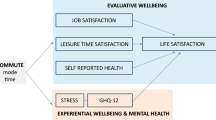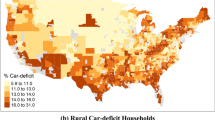Abstract
Transportation planners and transit operators alike have become increasingly aware of the need to diffuse the concentration of peak period travel in an effort to improve gasoline economy and reduce peak load requirements. An evaluation of the potential effectiveness of strategies directed to achieve this end requires an understanding of factors which affect commuter trip timing decisions. The research discussed in this article addresses this particular problem through the development and estimation of a commuter departure time (to work) choice model.
A number of conclusions were drawn based on the departure time model results and related analyses. It was found that work schedule flexibility, mode, occupation, income, age, and transportation level of service all influence departure time choice. The uncertainty in work arrival time and the consequences of various work arrival times may also be determinants of commuter departure time choice.
The estimated model represents improvements over previous work in that it more explicitly considers work arrival time uncertainty and travelers' perceived loss associated with varying work arrival times, and additional socio-demographic factors which can potentially affect departure time choice. Furthermore, the estimated model includes consideration of transit commuters, in addition to single occupant auto and carpool work travelers. The inclusion of transit commuters represents a particularly important contribution for policy analysis, since the model could potentially be used to study the effect of service and employment policies on transit system peak load requirements.
Similar content being viewed by others
References
Abkowitz, M. D. (1980). “The impact of service reliability on work travel behavior,” MIT, Department of Civil Engineering, unpublished PhD Thesis.
Horowitz, J. (in press). “Identification and diagnosis of specification errors in the multinomial logit model,” Transportation Research, Part B.
McFadden, D., Talvitie, A., Cosslett, S., Hasan, I., Johnson, M., Reid, A. and Train., K. (1977a). Demand Model Estimation and Validation. The Urban Travel Demand Forecasting Project, Volume V, ITS, University of California at Berkeley.
McFadden, D., Train, K. and Tye, W. B. (1977b). “An application of diagnostic tests for the independence from irrelevant alternatives property of the multinomial logit model,” Transportation Research Record 637: 39–45.
Small, K. A. (1978). “The scheduling of consumer activities: work trips,” Princeton University, prepared for presentation to the Econometric Society Annual Meeting, Chicago.
Author information
Authors and Affiliations
Rights and permissions
About this article
Cite this article
Abkowitz, M.D. An analysis of the commuter departure time decision. Transportation 10, 283–297 (1981). https://doi.org/10.1007/BF00148464
Issue Date:
DOI: https://doi.org/10.1007/BF00148464




